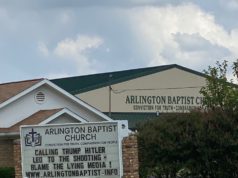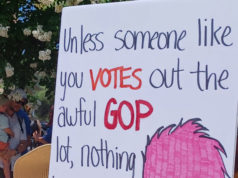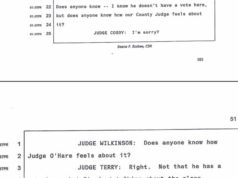The Texas Railroad Commission didn’t respond in time to get their comments in last week’s cover story on environmental threats and strategies in shale drilling (“Greening the Gas Field?” Jan. 6, 2010). (Full disclosure: The commission was asked for comment on Monday, the day before the story went to press.) But afterward, agency spokeswoman Ramona Nye had at least one bone to pick with the story.
She noted that activist Sharon Wilson had told Fort Worth Weekly that the gas industry is “completely on the honor system” and that in about 30 percent of drilling industry spills, “an inspector never comes out.” Even when inspectors do appear, Wilson said, “they must depend largely on what the company says happened.”
Nye said that in fiscal 2009, commission staffers inspected 96 percent of the 1,467 spills reported to their district offices. When spill samples are taken, she wrote, they are sent to third-party labs for analysis.
Wilson said the disparity can be explained, in part, by the difference between “reported” and “occurred.” She and other observers believe that the drilling industry fails to report a large percentage of toxic spills. In many cases that she has witnessed or that have been described to her by property owners, Wilson said, significant spills were reported by the companies only after the property owners started asking questions, and in many of those cases the commission relied on the company to provide a sample of what was spilled. That’s part of the reason she described the industry as being “on the honor system.”
In some cases, the difference between what happens and what gets reported seems to be a Catch 22: Environmental consultant Wilma Subra said she believes that gas companies, for instance, don’t advertise their use of cameras to look for pipeline leaks because they don’t want to be asked about how many leaks they find and fix.
Similarly, when Weekly reporter Peter Gorman talked to workers after a minor explosion at a gas well near a small town a couple of years back, he asked whether the leak that caused the explosion had been reported to the Railroad Commission. No, the worker said, because the leak had not been metered – that is, the amount lost had not been measured. Since only leaks over a certain volume are required to be reported … well, there was no way to say for sure that the leak qualified. So, no metering, no official leak, no leak report.
These days, with shale drilling booming and state revenues not booming, there’s no doubt that state regulators are overwhelmed. But if the Railroad Commission is indeed responding to almost every spill being reported, and yet neighbors of gas operations over and over and over again are seeing, hearing, smelling, tasting, getting sick from, and in some instances seeing their plants and livestock die from what appears to be gas well leaks, spills, and various forms of pollution, with little or no repercussions, then maybe it’s time to rethink the system.











